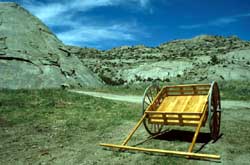Anna Matilda Anderson was a young girl who lived in Sweden in the 1880s. When she and her family joined the Church, they were ridiculed for their beliefs. Anna’s mother decided they should move to America and join the Saints in Utah. Anna was 11 years old when she and her sister, Ida, were sent ahead to earn money and bring the rest of the family. They sailed to the United States, then traveled by train to Ogden, Utah, where Ida left by covered wagon to work for her sponsors in Idaho. Anna was completely alone on that train as it continued to Salt Lake City. She spoke no English and knew no one.
Can you imagine the loneliness and terror of her ride? The train pulled into the darkened Rio Grande station just before midnight. The relative who was to meet Anna was not there. Anna stood watching with dread as the station slowly emptied. Finally, she was alone with a German family who also had no one to meet them. The darkness was thick and threatening, closing in around her. She later recalled: “I started to cry and thought about the last thing my mother told me: ‘If you come to a place where you can’t understand what the people are saying, don’t forget to pray to your Father in Heaven because He can understand you.’ ”
Anna knelt by her suitcase and pleaded with all her might for heavenly help. Haven’t we all said prayers like that? The German family motioned for Anna to follow them. Having no other choice, she walked behind them, crying. Arriving at Temple Square, they heard rapid footsteps. A woman was hurrying toward them, studying each person she passed. She looked at the German family, then pressed on. Anna caught the woman’s searching gaze. The woman stopped, unbelieving. She recognized the young girl! And with a shock, Anna recognized the woman. She was her Sunday School teacher who had left Sweden a year earlier! Pulling Anna tightly into her arms, the teacher wiped away her frightened tears. She told Anna: “I was awakened over and over again. … Images of the arriving immigrants raced through my mind. I could not go back to sleep. I was prompted to come to the temple to see if there was anyone I knew here” (journal of Anna Matilda Anderson, in author’s possession).
Can you believe it? A Sunday School teacher sent in a pitch-black night like an angel of light! “So you see,” Anna remembered, “my Heavenly Fathermore than answered my prayers. I only asked for someone who could understand me, and He sent someone I knew.”Years later, Anna explained how she took that amazing journey alone: Her faith in the Lord assured her that something better was waiting just ahead. This gave her the courage to cross an ocean without her mother, pray to her Father in Heaven when she was lost, and walk toward the safe haven of the temple. Anna moved through the unknown and left a path for others to follow. One of those who followed Anna’s faith-filled footsteps was my husband. You see, Anna was his grandmother.
– Bonnie D. Parkin, “Finding Faith in Every Footstep,” Ensign, May 1997, 84

